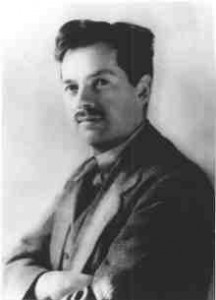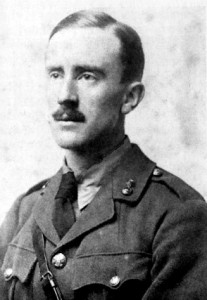There and Back Again
Eric Valentine Gordon
I can imagine them gathered around a table perhaps with a jug of ale, mead or warm cider. Finger foods, breads, meats and good conversation abound in tales of great imagination possibly anchored in some old tale of Norse or other. What brought them together…a common interest to share and then so many years later, so many tales, so many readings these stories released as films that I enjoy watching time and time again or the books I have returned to re-reading them with renewed imagination. What pray tell can these wanderings of tales of old could I be reckoning with?
I return again to Tolkien and his hobbits and rings, towers and kings, orcs and wizards. I have written before of Tolkien’s Great War and now I add his friend and Canadian soldier, Eric Valentine Gordon. Born in Salmon Arm, B.C. in 1896 Gordon was a student when he enlisted into the Canadian Field Artillery at Shorncliffe Camp, England, 11 August 1916. Gordon, service number 1260262 was, at the time of his enlistment, a student at University College, Oxford.
I originally found Mr. Gordon’s name amongst those Rhodes Scholars that I had previously researched with Great War service and was pleased to find Gordon’s C.E.F. record there among his brethren. Although troubled since childhood with asthma the condition did not stop Gordon from enlisting into the C.E.F., though it was soon apparent that this malady would take its toll and he was discharged in November 1916. For the good Mr. Gordon there would be no trenches or dire landscapes as witnessed by Tolkien.
There are many stories of those who served in the trenches and saw action at the familiar place names of the Great War. There are fewer stories though about those who were discharged due to medical disabilities and other reasons. I think upon those who did all they could to serve and am reminded of what must have been a rather small group of brothers the H.R.V.C., (the Vancouver based Honorably Rejected Volunteers of Canada) who had tried to enlist and for whatever reason were unable to serve despite their great desire. The H.R.V.C. had insignia, a lapel pin similar to those issued by the Canadian Patriotic Fund, or similarly the Silver War Badge. There were many other insignias produced at this time and all were important distinguishing marks to be worn during these times of conflict.
It is true that there were antagonists who harassed those they thought should be in uniform, Why are you not serving your country? and who at times distributed white feathers, representative of cowardice, to those they deemed were not doing their bit. Having actually seen an original feather and accompanying note it is very much another astonishing symbol representative of a complex time.
These pins, many subject to punishment if worn unlawfully, marked the man as one who had served or attempted to serve and displayed to potential antagonists that they had attempted to serve the cause or had been discharged from active service.
Returning to the good Mr. Gordon, I was inspired to learn, that he had worked with Tolkien and the two became great friends, who perhaps shared stories that led to the creation of that famed series of books now further immortalized by Peter Jackson.
Gordon, “Being no longer physically fit for war service” returned to school. He had attended Victoria College and McGill University prior to the Great War and afterwards taught at Leeds University 1922 – 1931 and Manchester University until his death in 1938. Gordon worked with Tolkien on A Middle English Vocabulary and Sir Gawain and the Green Knight. Together they created the Viking Club where Icelandic sagas of old were read, and amongst friends and faculty beer was consumed. Together Gordon and Tolkien enjoyed the creation of Anglo-Saxon songs that were later privately published as Songs for Philologists.
Gordon’s wife Ida later became a visiting professor at the University of Victoria in 1970. Their daughter Bridget MacKenzie, a lecturer in old Norse at the University of Glasgow, inherited several personal papers and books related to the friendship of her father and Tolkien. These documents were purchased by the Special Collections department of the University of Leeds. The University’s catalog description records, “The six letters, 11 manuscripts and two books include a copy of the extremely rare Songs for the Philologists, penned by Tolkien, Gordon and others, and a first edition of The Hobbit dedicated by its author to Gordon, his wife and young children.”
For me this research of friendship has taken me there and back again from re-reading The Hobbit and The Lord of the Rings series, re-watching Jackson’s interpretations of these journeys and to my Alma Mater, the University of Victoria. I see them all, the characters, Gandalf and Bilbo, Frodo and Sam of Tolkien and Gordon’s great imagination and creativity, those who are quite “little fellow[s] in a wide world after all” and see that indeed there really is no such thing as little fellows. All peoples are unique in their gifts of sharing knowledge for all. Thank goodness.



Comments